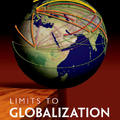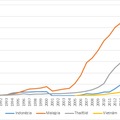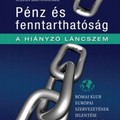Considering both its economy and population together, Brazil represents the 6th largest country in the world. The country is one of five new major players in the global economy referred to as the BRICS (Brazil, Russia, India, China and South Africa) countries. The last several decades of development in Brazil have been characterized by revolving cycles of internal and external disequilibrium. These prior decades of development, embodied in the conditions of neoliberal globalization, were not able to remedy the dependence of the economy that is so characteristic for peripheral countries, nor to mitigate the poverty belonging to this path. However, these problems began to ease as a consequence of two important shifts in economic policy, one at the beginning of the 1990’s and the second in the middle of the 2000s. The first shift was the successful stabilization of the Cardoso government in 1994, which created the basis for a well regulated and disciplined monetary system and budget in the framework of the neoliberal paradigm. However, this change was unable to soften poverty or to develop domestic production forces satisfactorily. The second shift in the middle of the 2000’s is represented by the neo-keynesian-type policy pursued by the Lula da Silva government, which resulted in a continuous and increasing redistribution of income to the poor, and gave a more active role to the state in the direct development of the domestic economy.
Beginning with Lula’s presidency, a pragmatic political course has been undertaken in Brazil, which fits into the conditions of neoliberal globalization, insofar as it maintains traditional market tools, connections and also monetary-budgetary equilibrium, but at the same time brings the task of decreasing poverty into focus.
Since 2004, cash transfers from the budget to the poor have contributed meaningfully to a decline in the Gini index that measures the inequality of income distribution. Minimum wages and public expenditure on health and education have also increased. In brief, Lula’s course has turned around, at least partly, the ‘perverse’ redistribution of income that traditionally meant money went to where it came from, the richest. In addition to this, production has been stimulated through public companies and programs. Among these programs, the most important has been the Growth Acceleration Program, launched just before the crisis in 2007. Thanks to these efforts, after 2004 the economy was led primarily by domestic demand. 6 million new jobs were created before the crisis and 30 million people were raised out of poverty. At the same time, and again with the support of the state, foreign trade relations were diversified and steps were taken to develop regional cooperation. Progress has been made on improving and democratizing institutions.
Hence the crisis found Brazil in relatively good condition and the country was quickly able to emerge from the slump in export markets by relying on the domestic market. This is why we can say that the management of the crisis began before the crisis by the management of the historical crisis of development. The management of the historical crisis of development has facilitated the management of the crisis that emerged in 2008.
In the second half of 2011, Brazilian economic growth came up against difficulties because of the weak global economy. But, instead of giving up the socio-economic course it had followed until then, the government simply reacted more strongly.
The Brazilian development in the last decade is part of the ‘Latin American turn’ that equally, but in many different ways, seeks an alternative to the hierarchical power relations of global capitalism. Although the Brazilian version of this endeavour does not upset the basic mechanisms and structure of the system of global capital, it testifies to the idea that only the developmental and socially responsible state can offset the effects of the pure market that cause socio-economic disparity and reinforce developmental hierarchy. The policy that aims to terminate social inequalities is the most significant economic policy and, at the same time, is the sine qua non of the historically progressive and – as the decade long popularity of Lula’s rule suggests – sustainable state.
(A longer version of this article will appear in the Institute of World Economics’ Report on World Economics)
Annamária Artner








